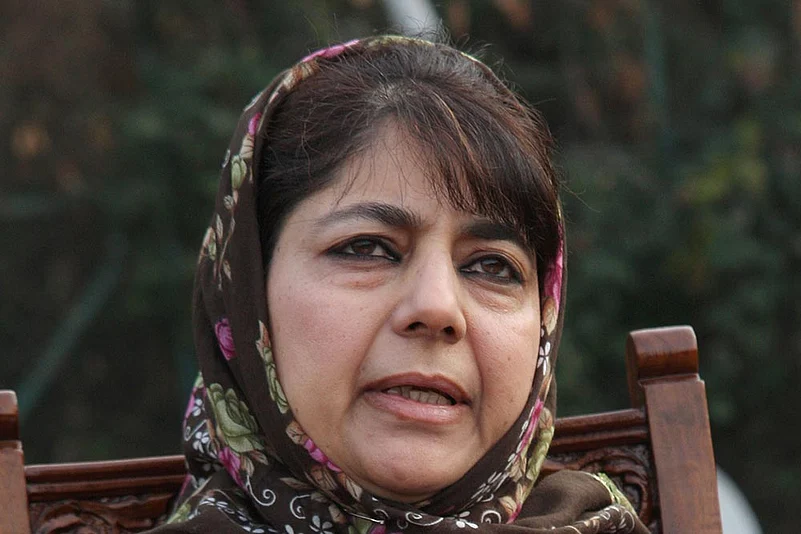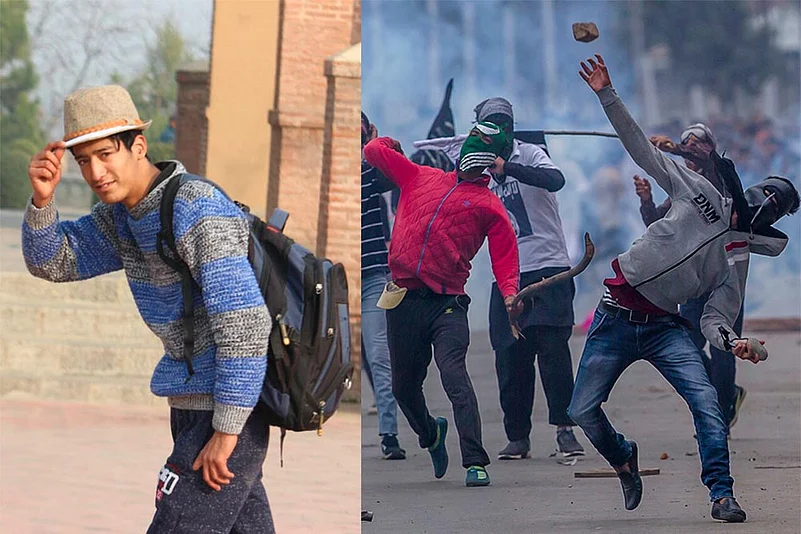Two students were waiting for a lawyer in the court premises at Tengpora, Srinagar, on Monday, December 4. They were worried as the court had issued a warrant against them for not being present on the previous date of hearing in stone-pelting cases. The students hope they would be among the 4,327 youths named in FIRs that the J&K government has decided to withdraw. “We will be withdrawing the FIRs of those who are not chronic stone-throwers,” IGP Muneer Ahmad Khan tells Outlook.
Government spokesperson and senior PDP leader Naeem Akhtar says the order to take back the cases was issued by CM Mehbooba Mufti, following the recommendation of a high-powered committee headed by the DGP. Within two months of becoming CM last year, Mehbooba had initiated the process of reviewing cases against youth involved in stone-throwing and several FIRs were withdrawn. The process was stopped, officials say, due to prolonged protests triggered by the killing of militant commander Burhan Wani on July 8, 2016. With the decision to withdraw 744 FIRs, the total number withdrawn so far on the CM’s directions has gone up to 848. Mehbooba describes the decision as a ray of hope for young boys and their families, calling it as an opportunity for them to rebuild their lives. She says it would help create a positive and conciliatory atmosphere in J&K.
Umar Habib, the older of the two students, is a tall first-year commerce student. He doesn’t even remember the exact date in 2011 on which the Maharaja Gunj police station arrested him in Old City, Srinagar. “I was in Class 7 then. And it was Sunday. That’s all I remember,” he says. He was walking with a friend when the police picked him up after an incident of stone-pelting in the area. He was released on bail after spending more than seven days in a police lock-up. That’s when his trips to the court began.
“The court buildings changed more than once during these years, but there’s no end to my hearings,” he says. When the FIR was registered against him, the court was in Lal Chowk area. After the 2014 floods, the court was shifted to Bemina in uptown Srinagar. This year, the lower court has been permanently transferred to a new building at Tengpora. Umar’s case has been clubbed with six other stone-pelters.
Once every two months, Umar has to be present in the court for a hearing. “It is a day wasted. They only give another date,” he says. This October, the court issued a warrant against him when he couldn’t be present at the last hearing. He says he could not go as his father, a cook, was not well. This Monday, the lawyer got the bail recalled.
“There is only one FIR against me. I don’t know whether it will be withdrawn. I don’t like pelting stones. Even on the day I was arrested, I was not throwing stones,” says Umar. He hates the courts. “This is no system for justice. I don’t think the case will end in my lifetime.”

The younger student with Umar, Tauqeer Ahmad Wani, 15, was arrested last year when the police raided his home in Gojwara in the Old City. The Class 10 student says he had given up stone-pelting long before. He was kept in the police lock-up for nearly a week and then shifted to a juvenile home. In the juvenile home at Harwan, he would look from the windows and wonder about the leisurely life of other people. His father, a tailor, would accompany him during the initial hearings, but he stopped later as it wasn’t worth losing a day’s income when there was no headway in the case. When Wani comes to the court, he brings his schoolbooks along. “The police punished me for giving up stone-pelting. Then they slapped two more cases against me. I am innocent,” he says.
Police officials say they are getting a good response from the people. A senior police officer posted in Old City says the process of withdrawal of the cases will take time. “Each case will be properly scrutinised and then the decision will be taken,” he says, adding that it has brought happiness to the youths as withdrawal of the FIR means the alleged stone-pelter is now eligible for a job, passport and other benefits. “Some parents are coming to us to know whether cases against their sons will be withdrawn or not,” the official says.
The government says the move will have a long impact and it will help in changing the thinking of people. “It is the first time such an amnesty has been given. The Omar Abdullah government gave no such amnesty,” says Akhtar. “It is a process that can actually be taken forward. It is the first time that everyone is on the same page. Earlier, if anything of this nature would be done in Kashmir, there would be an uproar in Jammu or some quarters in Delhi.” Describing the amnesty as reaching out to people through soft methods, Akhtar says there is a realisation that strong-arm tactics alone cannot help in sorting out issues in J&K. “Small initiatives can lead to big changes,” he says.
“The government is withdrawing from the trial in these cases. This is no amnesty as nobody has been convicted and involvement in stone-pelting is only an accusation so far,” says Mir Urfi, a lawyer who argues cases of alleged stone-pelters. According to her, the government has withdrawn 57 cases from the courts in Srinagar, and the list furnished by the Chief Prosecuting Officer to the courts has cases from 2008 to 2011.
Incidentally, the BJP is also supporting the move. The party says it is risky, but was necessary for peace. State spokesperson Virender Gupta says the government should, however, continue to observe the youths even after withdrawing the cases. “They should be kept in a camp and their behaviour observed,” he says.
Panthers Party president Bhim Singh, a bitter critic of the present government, says he has always been against the arrest of innocent people and then slapping multiple cases on them—something that is routine in Kashmir. Alleging that the state government is acting as the “slave and stooge of the central government”, he says it arrests people on directions from the Centre and later, again on directions from the Centre, the cases are withdrawn.
Former home minister and senior National Conference (NC) leader Nasir Aslam Wani, however, dismisses the government claim that cases are being withdrawn for the first time as a lie. “The government always lies and resorts to canards to build its image,” he says. During the erstwhile NC government, he claims, “a large number of the cases against students and educated youths were withdrawn, and they were allowed to appear for exams to join professional and other courses. We helped hundreds of youths involved in stone-pelting to a lead a decent life without making political capital out of it for ourselves.”
The separatists, though, are not impressed by the move. Mirwaiz Umer Farooq of the Hurriyat Conference argues that if the government is serious about “confidence-building measures” to enable the “peace process”, it should first repeal “black laws” such as the Armed Forces (Special Powers) Act (AFSPA) and release all “political prisoners”. “The government says FIRs against youths will be withdrawn. But it is not telling us that it lodged thousands of FIRs last year against youths, elders and children, he says. “In November alone, the police registered 25 FIRs in south Kashmir for alleged stone-pelting.”
By Naseer Ganai in Srinagar


























